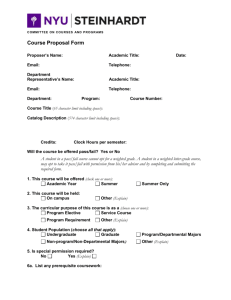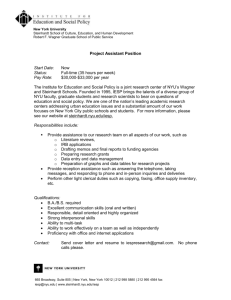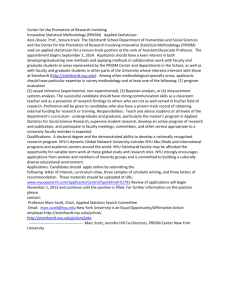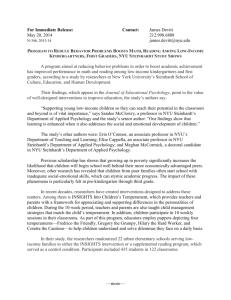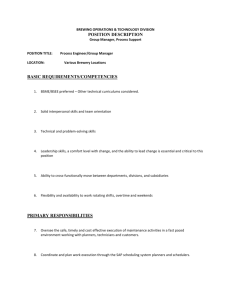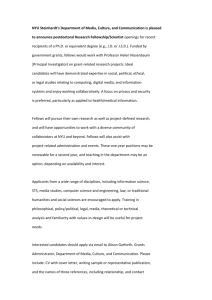SIGGUCS Presentation
advertisement
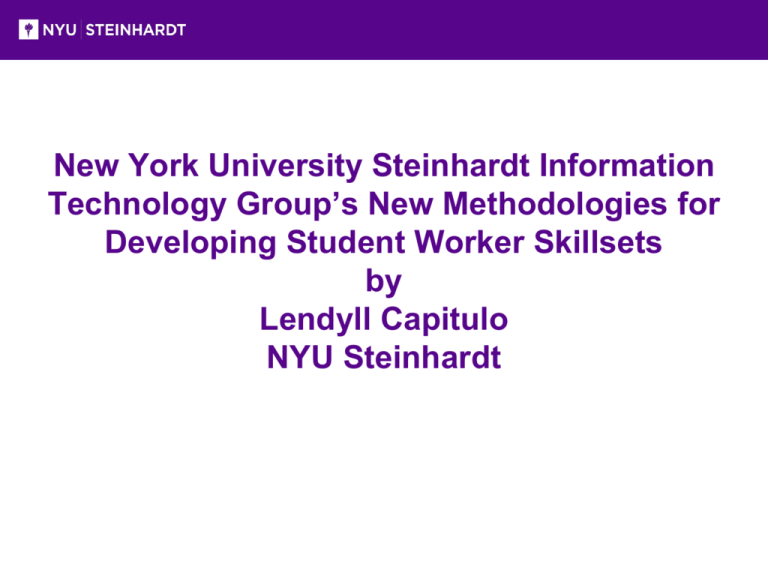
New York University Steinhardt Information Technology Group’s New Methodologies for Developing Student Worker Skillsets by Lendyll Capitulo NYU Steinhardt Structure of the Presentation • Introduction – Information about me, the team, the school and the University – Jump into how Steinhardt Technology Services thinks about Student Technicians • The “Problem” • The Steinhardt Technology Services Solution – Improving the skillset of our student technicians to fill in our operational gaps. Information about NYU Steinhardt • New York University of Steinhardt School Culture, Education and Human Development – 11 Academic Departments – 17 Research Centers and Institutes • Demograpics – 290 Full Time Faculty – 5,952 Students – Approximately 275 Staff Information about the Steinhardt Technology Services • Steinhardt Technology Services is a distributed technology resources that assists the Steinhardt Community with all their technology needs • The team is comprised of two smaller teams – Academic Technology Team • 4 full time staff • 3 part time student workers – Information Technology Team • 2 full time staff • 5 part time student workers Who I Am • I am an Information Technology Manager at NYU Steinhardt • Particularly I Have Several Roles at NYU Steinhardt – I manage the Steinhardt Technology Services Helpdesk – I train all information technology employees – I develop internal business systems for the Helpdesk Zendesk • Zendesk is a ticket tracking system than manages client agent interactions • Steinhardt Technology Services uses Zendesk to track all service tickets • Zendesk provides the data that we use to make business decisions Student Technicians • Two types of student technicians – Core Student Technicians – Student technicians that have had at least 6 months worth of development and training. – Non-Core Student Technician – Typically new student technicians that we’re developing • This distinction will be more important later on in our conversation Metrics • Time to first response – Defined as time for an agent to make a first comment/first interaction with a client with an issue – We view this as a measure of how responsive we are to our end users • Time to first resolution – Defined as time for an agent to solve a ticket – We view this as measure of how quickly and efficiently we solve an issue The Problem: Perfect Storm of Financial Limitations and New Initiatives • Limited financial resources – A budget crunch at Steinhardt leads to a temporary hiring freeze – IT Team Loses Two Positions – One person moves over to head the Academic Technology Team – Another team member finds another position at a different organization • The Dean of Steinhardt and Provost of NYU also wanted to move forward with new Academic Technology Initiatives The Steinhardt Technology Services Soluation • Have Student Technicians fill in the the operational gaps that occur with limited resources. • Well not so fast. Student technicians, while cost effective, come with a unique set of managerial challenges that need to be overcome if they the students are to fill those operational gaps. Three Primary Challenges to Developing Student Technicians • Limited Skillset – Several key competencies need to be developed before students technicians can be successful in the field • Organizational Buy-In Issues – Student technicians do not have the same ties to an organization that full time employees • Work/School Balance – Most student technicians balance student workload with their professional workload Three Strategies to Address Three Challenges • Student Focused Development Plans • Modular Trainings • Goal Setting Student Focused Development Plans • What are student development plans – Steinhardt IT Student Technicians Roles Matrix • Why we have student development plans – So we want to build our core compentencies for our student technicians so they have tools they need to succeed in the field • How we do student development plans at Steinhardt Technology Services – Constant Check-Ins – Mentoring Role Definition What We’re Looking For You are the first point of the contact between the SIT Group and the Steinhardt Community. •Effective Communication: You should be able to effectively communicate with both technical team members and non-technical community members. •Positive Attitude: You should approach problems with a positive attitude that engages and empowers members of the Steinhardt Community. Remember, you are the face of Steinhardt IT. Maintaining proper phone etiquette. Keeping all correspondence with community members prompt and professional regardless of the means (phone, ticket, email or in person) Using appropriate Macros You are our first line of defense when resolving short term issues. •Basic Troubleshooting Skills: You should be able resolve tickets using your knowledge, the Steinhardt IT Knowledge Base and other internet resources. •Triage Skills: You need to “triage” the unassigned ticket queue by deciding what can be done by a student technician and what needs to the escalated to a full time staff member. Resolving tickets using the Zendesk Ticket Resolution System Thoroughly documenting observations, assessment and attempts on ticket Use the Zendesk Help Center to access Technical Knowledge Base Articles Troubleshooting issues remotely using the Teamviewer Remote Support Software. Tag Tickets Appropriately using ticket tagging guidelines Operational Agent You are responsible for facilitating the behind the scenes work that keeps the SIT Group running. •Self-Motivated: We expect that you can schedule to complete your assigned operational tasks regularly and independently. •Attention to Detail: When performing operational tasks, you need to be able to spot and communicate when something is out of the ordinary so that the potential issue can be addressed quickly before it becomes a bigger issue. Performing operational tasks such as: maintaining our inventory, updating classroom computers, asset managing old computers Innovator You contribute to the academic technology conversation by making recommendations that help us carry out our mission statement. •Critical Thinking Skills: Most projects/tasks do not have typical solutions. Our student technicians need the ability to critically assess a problem and provide a solution. •Leadership: Before assigning more complex tasks, we want to ensure that our student technicians are able to take full responsibility and ownership over the tasks assigned. Taking on individual projects Tracking projects via Basecamp Project Management System Recommending upgrades to our internal business systems such as KACE Customer Service Representative Level I IT Support Agent Example of Tasks Mentoring • Between check-ins with full time staff members, new student technicians also meet regularly with core student technicians. • These meetings offer a different perspective of working at Steinhardt Technology Services than chatting with a full time member Constant Check Ins • One-on-one meetings with student technicians during the onboarding process – Meetings at Day 1, 2 Week, 6 Week, 3 Month and 6 Months • Bi-Weekly Student Staff Meeting – Operational objectives for the next two weeks – Reviewing data from Zendesk – Three Questions Round Table • What’s hot? • What’s not? • What do you need? Modular Training • What are modular training • Why we have modular trainings • How we do give modular trainings at Steinhardt Technology Services – Technical Training and Documentation – Culture Training and Documentation • Examples – Examples from Steinhardt IT Standard Operating Procedure Technical Training and Documentation • Steinhardt Technology Services Uses Technical Training and Documentation increase the skillset of student workers. • Technical training can be given by full time staff or core student technician Time Deadline (Urgency) Working Hours Lost (Impact) Example Issues VIPs Low Normal High Urgent No Hard Deadline Less than 1 week Less than 3 days Less than 1 day Less than 1 (end user ends up doing other work) Up to 7 hours 7 to 35 (hours calculated cumulatively across multiple persons) Greater than 35 hours Browser Issues Software Installations Single Computer Crash Administrative System Crash Server Crash All VIPs get an automatically +1 increase in priority (Low priority becomes normal, Normal becomes High, High becomes Urgent) Culture Training and Documentation • Steinhardt Technology Services uses Cultural Training and Documentation to instill the shared values of the organization within the Student Technicians • Culture training require the whole team to be present and are lead by a full time staff member. The following are pillars of internal communication at Steinhardt IT. These pillars were derived from a seminar held with the entire IT team in the summer of 2014. Notice the phrasing of the expectation and how it incorporates what the team as a whole does. • • • • • • Respect: Regardless of the circumstances, the major underlying expectation in all interaction is the mutual respect between both parties. This respect takes many different forms. Respecting for the Person: While everyone might not have the same job title, all team members have the ability to meaningfully contribute towards the mission of the group. All team members should respect everyone’s role towards working towards the mission statement. At Steinhardt IT, we recognize the importance of every member of the team and every member from the student technicians to the executive director deserves the same amount of respect. Respecting Time: Everyone on the team is busy with their individual tasks and projects. When assigning tasks it is important that a balance between what needs to be done and what has already been assigned should always be taken into account. At Steinhardt IT, we do not micromanage each of our team members. We trust that when a team member agrees to a task, they will complete the task or ask for further assistance if necessary. Respecting Abilities: Everyone on the team plays an important role and has unique abilities at Steinhardt IT. When we combine our roles and abilities, we are able to achieve much more than what we would be able to do if we all work alone. At Steinhardt IT, we want to create an atmosphere in which individual abilities are celebrated in context of what each member’s ability is able to contribute to the Steinhardt IT Mission. Be Present: When communicating with each other, it is important that team members give each other their full and undivided attention. Communicating is not just listening; it is also engaging, connecting, and empowering. For this reason, we use the phrase “Be Present” or “Being Present” to represent the idea of engaged communication. At Steinhardt IT, we strive to actively and critically engage each other as we communicate with each other. We strive to “Be Present” during a conversation. Accountability: There are times when we come together to work on a ticket, problem, or project and we all have assigned tasks. During these times, team members should hold each other accountable by engaging a conversation that follows up on the task. At Steinhardt IT, we believe that accountability does not just come from top down, but instead is a shared value. As such, we strive to hold each other accountable to the high standards that we hold for ourselves. Goal Setting • What is goal setting • Why we do goal setting with our student technicians • How we do goal setting at Steinhardt Technology Services • Examples of Student Goals SMART and CLEAR Goals • Steinahrdt Technology Services uses the CLEAR goal setting model. – CLEAR is an acronym for Collaborative, Limited, Emotional, Appreciable, Refinable • We use CLEAR because of the collaborative and emotional elements. At Steinhardt Technology Services we want to invest in each other goals. Examples of CLEAR Goals • Learn how to prioritize and manage my time. • Raise GPA by 0.4 points • Build a habit of keeping track of the type of work done at the end of the day, in order to reflect on any new skills acquired. Conclusion Part I • Let’s return to answering the question. Does implementing these strategies help student technicians fill the operational gaps? • Well let’s look at the data Time to First Resolution Conclusion Part II • So we have a couple of trends on the graph. – September 2014-There is a steep uptick in resolution time followed by a sharp decrease in October. This one employee left Steinhardt Technology Services – May 2015-Several of our core student technicians have graduated and we were training new core student technicians. • So in conclusion, Steinhardt Technology Services was able to use student workers to fulfill some of the operational gaps left by limited finacial resources and new Academic Technology initiatives. Future Challenges • Replacing student technicians, particularly core student technicians is slightly more difficult. • Hiring student techncians to full time position is another new frontier. The transition from casual employee to full time employee is one that requires skillful navigation. Questions • Feel free to contact me at lendyll.capitulo@nyu.edu for any follow up questions. • Just want to give a shout out to my student technicians and my supervisor Ben for allowing me to try something new.
